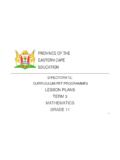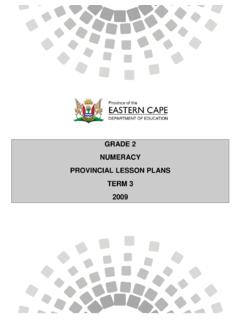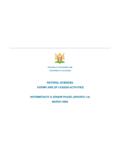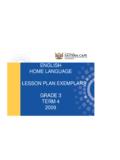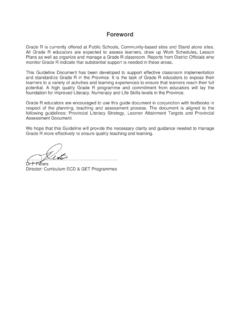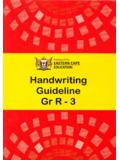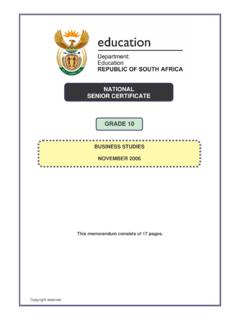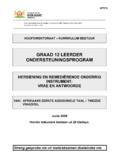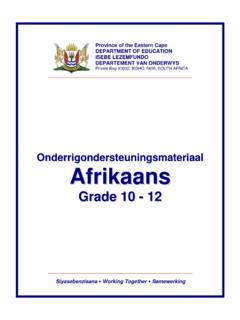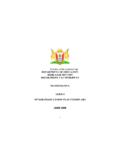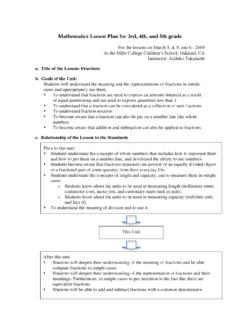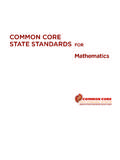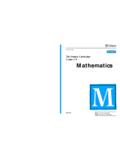Transcription of LIFE SKILLS LESSON PLAN EXEMPLARS GRADE 3 …
1 LIFE SKILLSLESSON plan EXEMPLARSGRADE 3 TERM 320092 TABLE OF CONTENTS CONTENT PAGESI ntroduction 3 Overview of a Learning Programme 4-7 Work Schedule 8-10 LESSON Plans Exemplars11-27 Formal Assessment Task28-29 3 INTRODUCTION The Eastern Cape Department of Education, Curriculum Chief Directorate in collaboration with the District Curriculum Advisors developed this document to support teachers in planning for teaching, learning and assessment for effective implementation of the National Curriculum Statement in the Foundation Phase Life SKILLS is one of the three Learning Programmes taught in the Foundation Phase. It deals with the holistic development of the child, socially, emotionally, personally and physically. It also provides inclusive topics or themes that are relevant to real life situation of a learner. These themes may promote literacy SKILLS through role play drama and discussions.
2 LO4 Physical Development will also consolidate some concepts in Mathematics and promote Numeracy SKILLS This document serves to assist teachers with daily teaching, learning and assessment in Life SKILLS for GRADE 1 3. A Work Schedule for term 3 has been developed. Integration of Assessment Standards has been done for the teachers. Planning accommodates Formal Assessment Tasks (FATs) and Learner Attainment Targets as indicated in the Draft LAT document which will be finalised soon and sent to schools. LESSON plan EXEMPLARS can be adapted and refined so that they meet the needs and the context of the learner .The resources that are indicated are a guide. Teachers are at liberty to use other relevant material. Teaching time for Life SKILLS is 1 hour 15 minutes daily, 6 hours 15 minutes weekly in GRADE 3 according to National policy. This time allocation for Life SKILLS must be adhered to. All the LESSON plans have been designed to cover Learning Outcomes and Assessment Standards for the third term according to the Work Schedule.
3 Teachers are advised to use the Provincial Assessment Guidelines for EXEMPLARS of assessment tools 4 GRADE 3 ANNUAL OVERVIEW OF A LEARNING PROGRAMMELO1: HEALTH PROMOTION ASSESSMENT STANDARD TERM 1 TERM 2 TERM 3 TERM 4 AS 1 Compares healthy and poor dietary habits and describes the effects of such habits on personal health. Distinguish between healthy an unhealthy food Categorise food into groups Functions of different food groups on the body. Importance of a balanced diet. AS 2 Participates in a recycling project and explains how recycling contributes to environmental health. Explanation of what Recycling is. Pollution and how it Affects the environment. Discussion of different types of waste and their possible uses. Grouping of waste products for recycling. Participation in a recycling project. AS 3 Discuses myths surrounding communicable diseases and the causes and preventions of these.
4 Examples of communicable diseases and how they are passed on including HIV/AIDS. Myths surrounding some communicable diseases including HIV/AIDS. Witchcraft. How to prevent isolation of infected and affected people through these myths. Eating and living with somebody with TB/HIV/AIDS. Hugging and kissing. AS 4 Identifies relevant people and their contact details to report cases of accidents, abuse, crime, fire, illness and injury. People in the health care and safety professions like nurses, policemen, social workers, traditional healers. Know them and their role in society. People in the health care and safety professions like nurses, policemen, social workers, traditional healers. Know them and Places to go to for help. Knowledge of emergency numbers like the nearest police station, ambulance, 5 GRADE 3 ANNUAL OVERVIEW OF A LEARNING PROGRAMME their role in society. etc. LO2: SOCIAL DEVELOPMENT AS 1 Explain leadership qualities in the school context and participates in school voting.
5 What is a leader (qualities) Explain terms associated with voting like :-Ballot paper Election, Nomination Secret Ballot Candidate, etc Explain leadership in school Characteristics of school leader they would vote for. Participation in a school vote. AS 2 Explains meaning of and sings the National Anthem. What is a National Anthem? List some of the messages in the anthem. Recognise and appreciate it when it is sung. Singing all the words of the National Anthem. AS 3 Discusses the role of acceptance, giving, forgiveness, sharing in healthy social relationships. Explain how people differ and how they can be similar. Understand that people sometimes have a difference of opinion about something. Importance of sharing with others and cooperating with people in celebrating the Heritage Day. Importance of sharing with others and cooperating with people. AS 4 Tells stories of female and male role models from a variety of local cultures.
6 Discuss male/female role models within communities. Equality of the sexes. State positive aspects about own role models. Women s Day talk through Same career choices for Both men and woman. AS 5 Discuss diet, clothing and decorations in a variety of religions in Identify prominent Religious celebration in their communities. Name and describing clothes worn by different religious leaders. Explain how food is used in certain religious ceremonies Discuss similarities and differences in festival decorations used by different religions. 6 GRADE 3 ANNUAL OVERVIEW OF A LEARNING PROGRAMMELO3: PERSONAL DEVELOPMENTAS 1 Describes own abilities, interests and strengths. Identification of own Personal interests. Explaining why one likes/ does not like certain things Understanding of what they can or cannot do (weakness vs strength). Self-assessment in terms of what one can/cannot do. Identification of one s strong points. AS 2 Explains why own body should be respected.
7 Understands different internal and external parts of the body and how they work. Ability to look after own body well, what to do, not to do. Identify forms of abuse and how they can happen. Understanding of what one could do in cases of abuse (who to tell, contact person, etc). AS 3 Explains how she/he copes with challenging emotions including dealing with living with diseases and illness. Understanding of life s challenging situations like death, terminal illness, etc. What to do/not to do when living with someone with a terminal illness like HIV/ AIDS Places to go to for help and support when dealing with sadness. Coping SKILLS to help in times of loss of sadness. AS 4 Demonstrates assertiveness appropriate to a situation. Knowledge of what actions to take when faced with different situations. People and places of help when needed. Decision making. Action plan for different situations. AS 5 Identifies group work SKILLS and applies them consistently.
8 Identify own role in class. Adhering to group rules. Listening attentively to others point of view when planting trees celebrating Arbor Week Taking responsibility and accountability in own group. LO 4: PHYSICAL DEVELOPMENT AND Demonstrates a variety of perceptual motor SKILLS , in Follows simple movement Performs movement Performs movement to a sound in sequence Remembers patterns of movement and performs 7 GRADE 3 ANNUAL OVERVIEW OF A LEARNING PROGRAMME pairs and in teams, using simple rules. rules. cooperatively. (alone, in pairs or in groups. them. AS 2 Performs basic movements in sequence and with repetition, with and without equipment. Uses different body parts to make rhythmic movements. Uses different body parts to make rhythmic movements. Appropriate use of equipment with body movements in sequence. Appropriate use of equipment with body movements in sequence. ASS 3 Explores expressive movements using contrasts of speed, direction, body shape and position.)
9 Follows the rhythm and speed of music whilst performing different movements. Follows the rhythm and speed of music whilst performing different movements. Follows movements and sequencing focusing on speed, rhythm direction and position. Follows movements and sequencing focusing on speed, rhythm direction and position. ASS 4 Participates in play and describes its effects on the body. Identify and play games they enjoy playing and explain why they like them. Play and explain importance of participating in play. Play and explain effects of physical activity on the body. Play a variety of games with rhythm, speed etc. Linking it to AS 1, 2 AND 3 (ABOVE) 8 LIFE SKILLS : GRADE 3 WORK SCHEDULE TERM: 3 WEEK 1 WEEK 2 ( OUR COUNTRY)WEEK 3 (HEALTHY LIVING)WEEK 4(COMMUNICABLE DISEASES)WEEK 5 (SAFETY)(CONSOLIDATION OF TERM 2 WORK) LO 2 AS 2 Explains meaning of and sings the National Anthem CONCEPT List some of the messages in the National Anthem.
10 LO 2 AS 2 Explain the meaning of and sings the National Anthem CONCEPT Recognise, appreciates and behaves when it is sung. INTEGRATION GEO: LO 1 AS 2 HL: LO 2 AS 8 MATHS: LO 1 AS RESOURCES Map, posters with the National Anthem, tape recorder ASSESSMENT STRATEGIES FORMS Oral, practical demonstration TOOLS Checklist, observation sheet, rating scale, worksheet METHODS Teacher, self, peer and group LO 3 AS 2 Explains why own body should be respected CONCEPT Identify forms of abuse and how they can happen. (WOMEN S DAY TALK THROUGH) INTEGRATION HL: LO1 AS 6 LO2 AS RESOURCES Pictures from heath centres Recorded article Puppets Magazines ASSESSMENT STRATEGIES FORMS Oral Written TOOLS Rating Scale Observation Sheet METHOD Teacher, Self, Peer and Group LO 1 AS 3 Discusses myths surrounding communicable diseases and the causes and prevention of these CONCEPT How to prevent isolation of infected and affected people thought these myths. LO 3 AS 3 Explains how she/he copes with challenging emotions including dealing with living with diseases and illness CONCEPT Places to go to for help and support when dealing with sadness.

